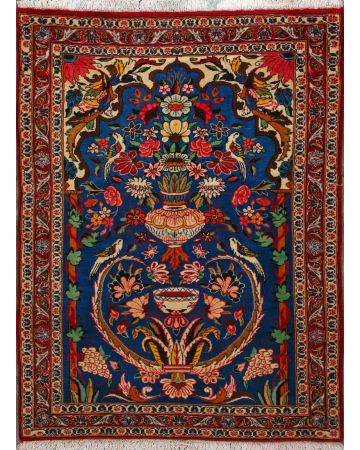Are The Older Rugs From Persia Considered Works Of Art?
There are few avenues in the art world that offer as much rich cultural and historical context as those found in the antique Persian rugs. The rugs that were woven in Persia were literally woven with the aesthetic and cultural ideals of an entire people, and perhaps most importantly, rug-making was the art form that the people of Persia took more seriously than any other.
The Persian
people took much pride in the textile art they created. Thus, it is in the
antique carpets from Persia that we find the very finest and the most important
examples of Persian textile art in general. To know the Persian rugs is to know
people and culture in a way that is rare in the world of art. Persian rugs are
regarded as one of the highest levels of artistic sophistication accomplished
by humankind. As such, designers, artist and rug collectors covet these
masterpieces.
Today, Iranian
carpets, both modern and antique, have found an ever-expanding home within the
art world. There is no doubt that Nain Persian rugs are amongst the most
beautiful and enduring artistic creation ever crafted. The beauty and
complexity of Persian carpets that are antique, is timeless, inspiring,
exciting and edifying.
Like the feeling
of intimacy that one experience when one sees the brush strokes in a painter’s finest
work, so too does one feel a connection to the master rug-makers of Persia when
one sees up close the meticulous weaves of a gorgeous rug. Persian rugs and
carpets are a wonderful treasure of humanity, and to be familiar with them as
such is to being familiar with the limitless nature of fine art.
Would Persian Master Weavers Sign Their
Carpets?
Sadly, the
majority of rugs, even the ones woven by master weavers, were not signed. The
method and signature of a master weaver can help in determining where the
carpet was made. It can even assist with what style the carpet exhibits, and
naturally, who the weaver was. Urban cities have traditionally facilitated Persian
weaving as a commercial industry.
Any production
of a manufacturer would have been greatly influenced by the market demands of
the time. At the helms of such production companies were the master
rug-weavers. These individuals were the ones who chose the colors and organized
the weavers. These master weavers designed with a personal identity that
superseded group identity.
Therefore, in
such instances, the vernacular craft gave way to conscious visual art form.
Today, these masterworks can be found in museum collections such as The
Metropolitan Museum. They can even be found in the inventories of fine antique
carpet galleries.
With countless
Persian traditions and designs developed and maintained by weavers in any
single cultural group or city, boundless variations are probable when
provincial designs and miniature differences in stuff and technique are melded
together.
If you are also
in search of one of the best, traditional discount Persian rugs online, you
simply can’t afford to miss out browsing through the complete selection
available at ArmanRugs!
.jpg)



Comments
Post a Comment